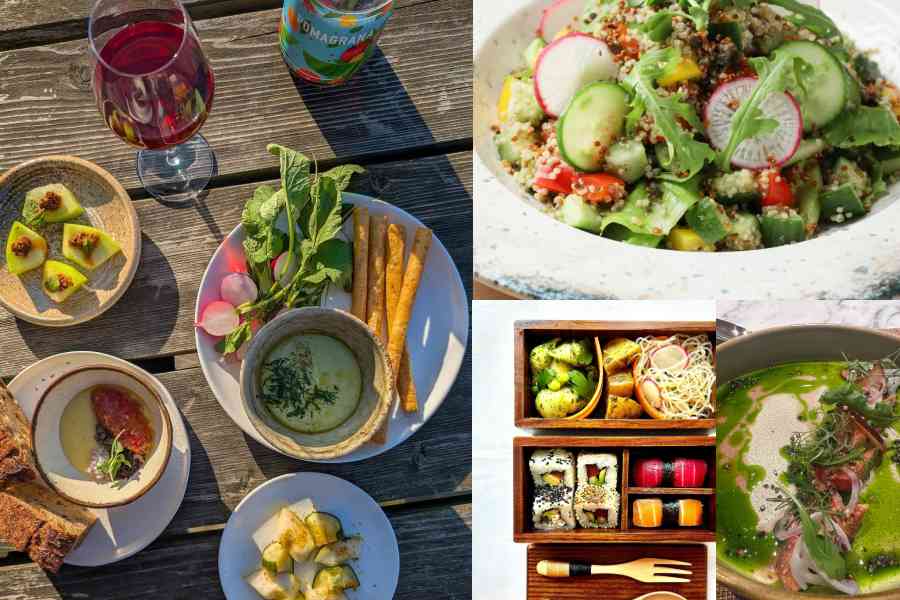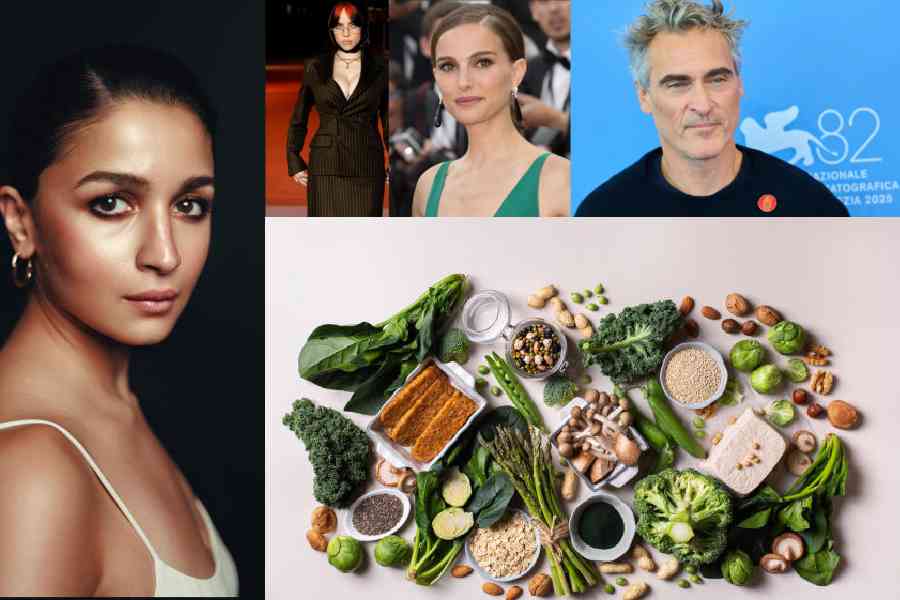What began as a quiet ethical choice has now become a global cultural shift. In 2025, veganism isn’t just about food — it’s about a mindset that spans how we eat, dress, and live. As climate anxiety rises, wellness becomes aspirational, and consumers demand transparency, veganism has found its place at the heart of modern lifestyle narratives.
This month, as the world celebrates World Vegan Month, it’s worth revisiting how it all began, how far it has come, and how its evolution now influences everything from fine dining to fashion and beauty shelvesVario

Various kinds of vegan products. A vegan eatery Blooms
The Roots: From Ethical Diet to Global Movement
While vegetarian practices have existed for eternity across cultures — from Jain and Buddhist traditions in India to ancient Greek philosophy — modern veganism took its distinct shape in 1944. That year, The Vegan Society and a small group in the UK coined the word “vegan” from “vegetarian”, symbolising a more complete commitment to compassion.
What started as an ethical dietary philosophy gradually expanded into a lifestyle choice rejecting all forms of animal exploitation. By the 2010s, with environmental science, health research, and social media converging, veganism transformed from a niche to a global movement.
Why 2025 Marks a New Era for Veganism
The numbers tell the story. Plant-based food markets are booming, vegan cosmetics have gone mainstream, and nearly every major city now has dedicated vegan cafés or cruelty-free beauty stores. Consumers today connect food choices with climate responsibility, seek holistic health benefits, and embrace the aspirational aesthetics of plant-forward living. Veganism has become a lifestyle — clean, conscious, and creative.
The Celebrity Effect: When Stars Go Plant-Based
Pop culture continues to fuel veganism’s evolution from a niche trend to a mainstream, aspirational lifestyle. International icons like Joaquin Phoenix, Billie Eilish, Natalie Portman and Lewis Hamilton have long championed plant‑forward living — promoting it as a philosophy rooted in compassion, wellbeing and high performance. Natalie Portman, who went vegetarian at nine and later turned vegan, has consistently used her public voice to advocate for ethical consumption. Through her influence, veganism is increasingly seen not as a restrictive practice but as an expression of values, wellness and modern identity.
In India, the movement is gaining similar momentum as top stars integrate cruelty‑free philosophies into beauty, fashion and lifestyle. Alia Bhatt has supported sustainable fashion initiatives and invested in cruelty‑free innovation; Jacqueline Fernandez has participated in animal‑welfare campaigns; and Sonam Kapoor Ahuja continues to champion conscious beauty and ethical dressing. Their influence has helped pose plant‑based and cruelty‑free living as stylish, relevant and accessible — redefining it as a lifestyle that is both aspirational and authentic.
Meanwhile, the cultural narrative is deepening through fashion and film. Designer Anamika Khanna, a vegan herself, has emphasised sustainability within luxury fashion, focusing on durability, craftsmanship and reducing waste — advocating for clothing designed to be cherished rather than discarded. Complementing this shift, Natalie Portman’s documentary contribution has been pivotal: she co‑produced and narrated the 2018 film Eating Animals, based on Jonathan Safran Foer’s influential book. The documentary exposes the realities of industrial farming, environmental degradation and animal welfare concerns, pushing the global conversation on plant‑based living into deeper ethical and ecological territory. Together, these celebrity voices, design innovators and cultural storytellers are reframing veganism as a holistic expression of wellness, responsibility and contemporary style.
Inside the Kitchens Powering the Vegan Shift
The rise of veganism in India is no longer a fleeting trend — it’s a cultural movement reshaping the way the country cooks, eats, sources, and even thinks about food. What started as a niche preference among a small set of diners has evolved into a mainstream shift driven by wellness, sustainability, and a renewed respect for produce. Across India’s restaurants, hotel kitchens, indie cafés, and luxury dining rooms, chefs are discovering that the future of food may well be plant-forward — not as restriction, but as possibility.
Chef Sneha Singhi has watched this change unfold in real time. For her, the rise of veganism has unlocked new creativity. “It’s wonderful to see how the awareness around veganism has grown — it’s opened up such an exciting space for creativity and compassion. I make sure every menu I create includes at least a few vegan dishes or plant-based alternatives, because it’s not just about food anymore; it’s about being kind to animals, to the planet, and to ourselves.”
For chef Urvika Kanoi, of The Daily Cafe, “the inclusion of vegan-friendly menus have now become as simple and easy as having veg or non-veg or gluten or sugar-free. More and more restaurants are seeing a market that is on the rise and by including these menus they stand at a better chance to get exposure and visibility. It is an international standard, and many people today also have dietary restrictions, that has also seen a rise in vegan trends.”
Her approach reflects a broader shift — vegan food is no longer a compromise, it’s a challenge chefs embrace with enthusiasm. Chef Auroni Mookerjee echoes this sentiment, viewing the movement as both an evolution and an opportunity. “As a chef it’s a new trend that I am all for. The more I have evolved, the more important it has become for me that diners have the right to make culinary choices. Eating plant-forward is becoming a holistic choice… and it’s challenged me to discover new ingredients and techniques. It’s helped me find a new gear of hospitality.” For chefs like him, veganism is expanding the vocabulary of flavour, not narrowing it.
Veteran chef and global culinary icon Asma Khan adds another dimension: plant-based dining is becoming a part-time lifestyle for many diners. “My best friend is vegan over the week, and I’ve noticed many customers avoiding dairy on certain days. No restaurant today can afford to not have options for vegans.” Her observation captures a truth about modern India — flexibility, not rigidity, is steering food choices.
International chains and homegrown restaurants are responding with intention. Wagamama — globally known for its Japanese-inspired bowls — has seen veganism transition from niche to necessity. Their menu now celebrates plant-based abundance, from ramen and donburi to curries and teppanyaki. “Inclusivity is at the heart of everything we do,” they say, using vegetables like edamame, lotus stem, aubergine, radish, and tofu to create dishes that are fresh, wholesome and full of flavour,” said Vivek Raghunath, business head, Wagamama India.
Luxury hotels, too, are embracing this new culinary philosophy. At JW Marriott Hotel Bengaluru, sous chef Trilok Singh is steering a movement rooted in regional wisdom and contemporary technique. “We’ve noticed a growing curiosity toward conscious, plant-based food that doesn’t compromise on flavour. Our inspirations come from rural Karnataka, where grains, lentils and seasonal produce form the heart of daily meals.” His signature dish — Roots and Fruits — uses fermentation and slow-roasting to showcase the natural depth of vegetables.
Italian restaurants across India are also reimagining their classics. At Rosmarino, Chef Abhijit Saha champions vegan versions of Neapolitan pizzas using house-made vegan mozzarella, alongside dishes like Farro Salad, Avocado on Crispy Polenta, Spaghetti Alla Nerano with vegan cheese, and Oat Milk Pannacotta. “We celebrate vegetables and grains as heroes, not substitutes,” he says, emphasising inclusivity and authenticity as the core of their culinary philosophy.

Different types of lip-smacking vegan dishes
In Rajasthan, Chef Amitesh Virdi of Fairmont Udaipur Palace highlights how naturally suited Indian cuisine already is to this movement. “Rajasthani cuisine’s vegetarian selection has always been ahead of the curve — lentils, millets and regional vegetables form its soul. Crafting vegan food isn’t about substitution, but about respecting nature’s produce.” His plant-forward Asian dishes also reflect the growing appetite for freshness, purity and balance.
Mumbai diners, too, are eager for bold, global vegan flavours. At CosyBox Mumbai, the menu stretches from Vegan Khow Suey and Truffle Hummus to Hot Sichuan Tofu Bowls and Quinoa Pumpkin Croquettes. As executive chef Arvind Pal puts it: “Veganism is no longer just a dietary choice — it’s a lifestyle that inspires innovation. We approach it not as an alternative, but an opportunity.”
At Naarma, Chef Hilal brings indulgence to the forefront, proving vegan dining can be expressive and luxurious. “Dishes like Naarma Shroom and Mount Fuji show how textures and bold dressings can create depth of flavour without compromise. Plant-based dining isn’t an alternative — it’s an experience.” Even pan-Asian favourite Andrea’s is leaning into the movement. Founder Andrea Pauro believes creativity lies at the heart of plant-forward cooking: “Vegan cooking isn’t about compromise; it’s about flavour. From Mala Chilli Tofu to Thai Green Curry, every dish celebrates produce and texture. Food should be inclusive — that’s our philosophy.”
In Seoul, Legume, Asia’s only vegan Michelin-starred restaurant, is redefining the fine-dining landscape. Chef Sung Si-Woo, who was recently in Calcutta for a special dinner at Taj Bengal, shared: “I opened Legume because Korean vegetarians had no options, and also because my mom was allergic to many food groups. I hope one day we rely only on seasonal ingredients for future generations.” His fig, lotus root and vegan cheese salad, and Hazelnut Sorbet, Black Truffles and Caramel Ice Cream left us spellbound.
Beyond Food: The Vegan Beauty & Fashion Wave
The rise of veganism in India is no longer confined to what’s on the plate — it now shapes how consumers shop, dress, and define holistic wellbeing. As conscious living shifts from trend to lifestyle, beauty and fashion are undergoing a remarkable transformation led by brands committed to cruelty-free innovation, ingredient transparency, and low-impact design.
In India, this movement is being championed by a dynamic mix of established and emerging clean-beauty pioneers. Plum Goodness — one of the country’s earliest 100 per cent vegan skincare brands — has set the standard with science-led formulations that are both accessible and ethical. asa Beauty’s refillable packaging and sustainability-first approach exemplify responsible luxury, while Earth Rhythm blends biotechnology, smart actives, and eco-conscious design. Disguise Cosmetics is redefining colour cosmetics through fun, cruelty-free formulations tailored to Indian skin tones. The Nature’s Co. draws on nature and Ayurvedic wisdom to craft plant-based rituals, while Xyst Skincare focuses on research-driven products that pair high performance with ethically sourced ingredients.
A new crop of indie innovators is further enriching India’s vegan beauty landscape. Ilana Organics embraces superfood-powered skincare; Juicy Chemistry has carved a niche with certified organic, cold-pressed formulas; Neemli Naturals merges natural actives with laboratory precision; and D’you centres its philosophy on minimalism, ingredient clarity, and efficacious blends. Together, these brands reflect an India that is increasingly prioritising clean, conscious, and cruelty-free self-care.
Gunjan Agarwal, co-founder of Xyst Skincare, underscores this shift: “The vegan cosmetics market is projected to exceed USD 20 billion by 2025. This growth reflects a clear movement toward cruelty-free, plant-based skincare — one we’ve been proud to pioneer with clean, ethically sourced ingredients.”
Around the world, leading skincare and cosmetic houses are embracing vegan innovation, proving that ethical beauty is no longer niche. The Body Shop continues to champion cruelty-free formulations; e.l.f. Cosmetics offers a fully vegan range at accessible prices; Pacifica, Herbivore Botanicals, Pai Skincare, Summer Fridays, Biossance, Youth to the People, and Milk Makeup are all pushing the boundaries of clean, plant-based beauty using botanical actives, biotechnology, and transparent sourcing practices. These brands are shaping a world where vegan beauty is not a compromise — it’s elevated, effective, and ethical.
Vegan Fashion: Style With Substance
The fashion world is evolving, with Indian and global brands pioneering cruelty-free, material-conscious design.Leading Indian Vegan Fashion Brands: No Nasties: 100 per cent vegan, organic and fair-trade apparel known for carbon-neutral practices.
Ethik: Bengaluru-based leather-free footwear and accessories brand.
FOReT: Premium accessories crafted from plant-based materials like cork.
A Big Indian Story: PETA-approved Vegan bags and accessories made from cactus and apple leather.
Amar Kosa: Sustainable label focusing on handloom, vegan fabrics, and slow fashion.
The rapid rise of vegan fashion reflects three major cultural shifts: material innovation, ethical consumer demand, and the blending of sustainability with style. Whether it’s cactus leather handbags, recycled-fibre sneakers, or organic-cotton apparel, vegan fashion is redefining what modern luxury looks like — conscious, responsible, and future-facing. Together, India’s growing vegan beauty and fashion industries reflect a powerful evolution: veganism is no longer simply a dietary preference — it is a lifestyle philosophy, a cultural identity, and a creative movement shaping the future of self-care and style.
Veganism in 2025 is not a trend — it’s a transformation. The future of conscious living is plant-powered, compassion-driven, and beautifully sustainable.










